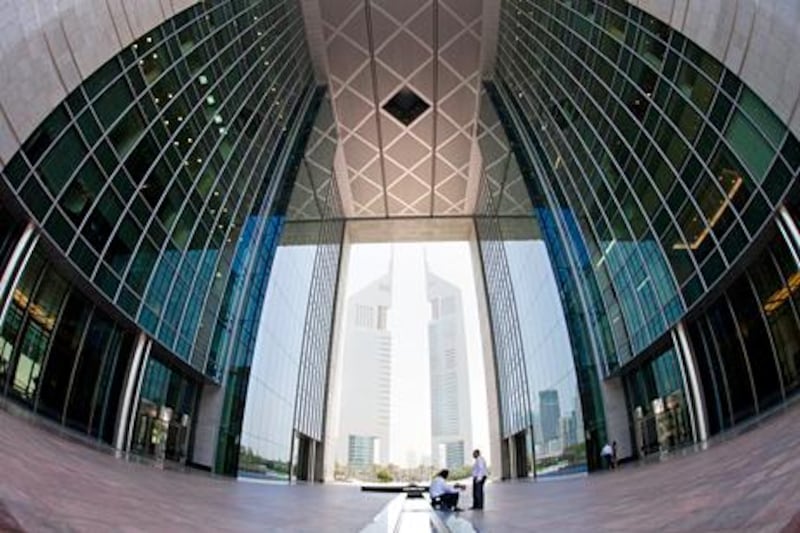Dubai's financial free zone approached full capacity as it added 1,000 jobs in the first half of the year.
The Dubai International Financial Centre said yesterday that the number of active registered companies in its precincts grew to 979 in the first half, a 7 per cent rise in six months. Some 1,000 new jobs were created in the centre, with 15,000 people now working in DIFC daily.
Jeff Singer, the chief executive of the DIFC Authority, said that occupancy of DIFC-owned offices in the central Gate district increased from 94 to 97 per cent. Retail space was at 99 per cent occupancy.
"The centre's unique infrastructure, internationally recognised legislative and regulatory framework and dynamic business environment have positioned DIFC to become a financial ecosystem," he added.
Mr Singer said that rents had not risen since 2010, when they were reduced in response to the fallout from the global financial crisis. But he declined to give detail of the timing of any possible review of prices.
He said that one of the most important factors in the growth of the DIFC was the global economic climate.
"Interest from North America and Europe continues to increase as western multinationals look to diversify their operations and expand towards the East. DIFC has also witnessed sustained interest from Middle East and Asian firms looking to diversify their exposure to opportunities arising in Africa and the West," he said.
A geographical breakdown of regulated companies in the centre shows that 36 per cent come from Europe, 27 per cent from the Middle East, 16 per cent from North America, 11 per cent from Asia and 10 per cent from the rest of the world.
"We're becoming an established international hub for business in what we call Measa - the Middle East, Africa and South Asia. We are poised for a new level of growth," he said.
He expected new business to come from Asia, especially China, where four of the top five banks already have a DIFC office.
"We have fewer firms from Asia, but they usually bring in more employees, simply because they are bigger firms," he said.
He also wanted to attract more Middle East business, conceding that the rapid initial influx of financial institutions after the Arab Spring in 2011 had slowed.
"We have underpenetrated markets in the Gulf and Middle East region. That is a major part of the growth strategy," he added.
In the first half, DIFC issued 94 new commercial licences, of which 31 were to regulated companies, including China Construction Bank, Bank of Baroda, Agricultural Bank of China and Asia Capital Re.
Some 21 of the world's top 25 banks are now represented in DIFC, 11 of the top 20 money managers, six of the largest 10 insurers and six of the top 10 law firms.
Dubai ranks sixth in a ranking of international business centres drawn up by The Banker magazine.
The centre also attracted 21 new retailers in the first half, including The Magazine Shop and Max Electronics.
Mr Singer added that DIFC was on track to hit its target, announced last year, of doubling in size by 2017. New office space is available in properties not owned or managed by DIFC, such as Index Tower, Park Towers, Liberty House and Emirates Financial Towers.
About 372,000 square feet of office space is currently occupied at these sites, although DIFC could not say which occupancy level that represented.
A 48-storey residential and leisure development in the DIFC jurisdiction was recently launched as part of the Central Park project.
Mr Singer said the planned financial free zone in the capital, Abu Dhabi Global Market, represented "an opportunity to help us take our game up. There is a pattern for Abu Dhabi and Dubai working together and collaborating on major projects, and this will continue".
He added there had been no contact between the Abu Dhabi authorities and the DIFC on the project, "at least not at my level. But if they asked we would of course cooperate and provide assistance".





